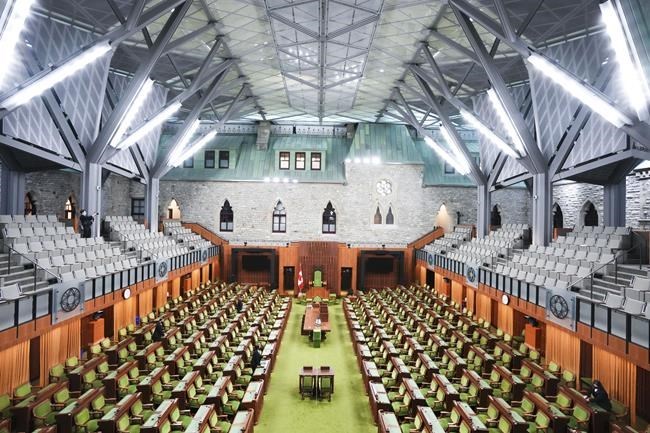OTTAWA — Members of Parliament have returned to the House of Commons for the first time in five months and were quickly told they have until just before the holidays to OK a new round of pandemic aid.
Government House leader Mark Holland said a bill to approve billions in new aid for businesses still hurting from COVID-19 is one of four pieces of legislation the Liberals want passed by the middle of next month.
Of the remaining three, one bill would approve 10 days of paid sick leave for federally regulated workers, another would ban conversion therapy that targets LGBTQ people, and another would fulfil a campaign promise to criminalize the harassment of health-care workers.
Holland said he expects the bills to pass on the aggressive timeline while warning the government won't tolerate any political shenanigans to stall the legislative agenda.
"The good news is that's the spirit I've heard from all of the parties," Holland said at a morning news conference.
"It is my expectation that we can work collaboratively in a way that will allow fulsome debate, but fulsome debate in the context of the situation that we're in, which is that we've already had significant debate on these issues."
The legislative agenda promises to be packed, with the Liberals having pledged in their election platform to introduce or reintroduce at least eight bills in the first 100 days of their third mandate. The Commons is scheduled to sit only 24 days before the 100-day clock runs out on Feb. 3.
NDP Leader Jagmeet Singh said his party was in talks with the Liberals about ways to speed up passage of bills that have New Democrat support, such as banning conversion therapy and paid sick leave, given the limited number of days for debate.
In an earlier interview, NDP House leader Peter Julian did not rule out limiting the time for debate on some bills.
"There's a number of different tools: expanding debate, having some additional time in the evenings is one way. Having a deadline in terms of debate is another, that's agreed on by a majority of parliamentarians," he said.
The opposition parties will have their own issues to put on the parliamentary docket, such as an emergency debate on the situation in British Columbia that Singh and the Tories called for Monday.
"The Liberals call the agenda. It's their decision when they call back the House," Singh said, alluding to the weeks that have passed since the Sept. 20 election that saw only a handful of seats change hands.
"If there's not enough time to pass crucial things, it's going to be the Liberals that are to be blamed."
Since they hold only a minority of seats, the Liberals can't necessarily control the agenda. The government will likely rely on the New Democrats and, occasionally, the Bloc Québécois to pass legislation and survive confidence votes.
Singh told reporters there was no deal for his party to prop up the Liberal government.
Before debates begin, the parties must decide whether MPs can take part in proceedings remotely, as they have since the start of the pandemic, amid mistrust over the vaccination status of Conservative MPs.
MPs walking into the West Block on Monday were happy to be back and felt safe working in person, which Liberal MP Ken McDonald said is something Canadians want to see.
"Hopefully we can keep it going and everybody abides by the rules and stays safe," McDonald said.
The issue of Conservative MPs' vaccination status gained fresh urgency over the weekend when Quebec Tory MP Richard Lehoux was diagnosed with COVID-19 despite being fully vaccinated.
Lehoux attended a two-day, in-person caucus retreat late last week and under public-health guidelines the party said will be followed, that could mean any unvaccinated colleagues will have to self-isolate.
Conservative Leader Erin O'Toole has refused to say how many of his MPs have not received two shots, only saying that all 119 Conservatives will be able to enter the Commons because they are either immunized or have a medical exemption.
Bloc House leader Alain Therrien called on the Conservatives to be transparent about vaccinations, but welcomed the system set up to verify immunization status to cut through the vagueness from the Tories.
Holland said the Commons needs to check anew the validity of medical waivers claimed by an unknown number of Conservative MPs, questioning whether they were legitimate.
Conservative MP Michael Barrett challenged anyone to prove wrongdoing as he noted that anyone with an exemption had it vetted by licensed medical staff at the House of Commons.
Holland also expressed frustration that the parties haven't been able to agree to hybrid sittings.
Liberals, New Democrats and Greens strongly favour continuation of the hybrid format, but the Conservatives and Bloc Québécois want the Commons to fully return to normal in-person proceedings.
Because there is no unanimity on how to proceed, the matter will likely be put to a vote later in the week.
The first piece of business Monday was the election of a new Speaker. Only MPs who were in the House were able to vote, and majority support went to Liberal Anthony Rota to stay in the position.
Up next is the government's throne speech that Gov. Gen. Mary Simon will deliver in the Senate on Tuesday to officially open the new session of Parliament.
This report by The Canadian Press was first published Nov. 22, 2021.
— With files from Mia Rabson
Jordan Press and Joan Bryden, The Canadian Press


